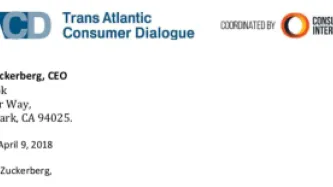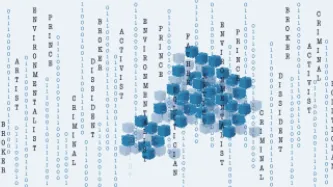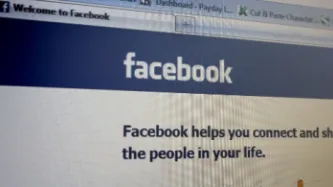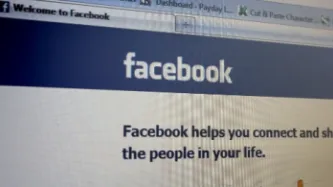Advanced Search
Content Type: Examples
In November 2007, Facebook launched Beacon, an advertising programme that allowed third-party sites to include a script that passed Facebook notifications about users' activities on their sites such as purchases, auction bids, reviews, and game-playing. The service as originally designed offered no opportunity to opt out, and a public outcry ensued; many people did not want their activities broadcast automatically to all their Friends. Users also soon found that Beacon transmitted information…
Content Type: Examples
In 2006, Facebook redesigned its system to add News Feed and Mini-Feed features, which the company said were intended to give users information about their social world. The News Feed was designed to provide a constantly updated stream of stories including updates from each user's Friends and Facebook groups, along with news stories tailored to their interests. Mini-Feed collected each user's updates into a new section on their profile page. Almost immediately, public backlash forced company…
Content Type: Examples
Over the years from 2005, when Facebook was still known as "Thefacebook" and its membership was still limited to verifiable Harvard students, to 2010, Facebook changed its privacy policies many times. Over that time, the default circle of who could view users' data widened over time, first to include schools and local areas, then to the entire Facebook network, then to the wider internet, and finally to third-party apps and advertisers. Taken together, the story is one of a service that began…
Content Type: Long Read
Hasn't Facebook said it would give European data protection to all of their users?
Yes, but only in very vague language. In an initial reaction to the Cambridge Analytica scandal, Mark Zuckerberg declared that Facebook would apply the EU General Data Protection Regulation (GDPR) “in spirit” to their 2 billion users worldwide. When questioned by members of the US Congress, Zuckerberg declared that "[a]ll the same controls will be available around the world". Representative Green sought…
Content Type: Examples
In March 2018, Facebook announced it was scrapping plans to show off new home products at its developer conference in May, in part because revelations about the use of internal advertising tools by Cambridge Analytica have angered the public. The new products were expected to include connected speakers with digital assistant and video chat; they are now undergoing a review to ensure that they incorporate the right approach to user data. At the developer conference the company will also explain…
Content Type: Examples
Users downloading their Facebook histories have been startled to find that the company has been collecting call and SMS data. The company has responded by saying users are in control of what's uploaded to Facebook. However, the company also says it's a widely used practice when users first sign in on their phones to a messaging or social media app to begin by uploading the phone's contact list. That data then becomes part of the company's friend recommendation algorithm. On versions of Android…
Content Type: Examples
The accuracy of Facebook's ad targeting sometimes leads users to believe that Facebook is spying on them by tapping the microphones in their phones. Facebook has denied the practice - and is likely telling the truth because uploading and scanning the amount of audio data such a system would involve an unattainable amount of processing power to understand context.
It sounds believable: Joanna Stern's mother told her to buy the decongestant Sudafed in the morning, and by afternoon she sees…
Content Type: Examples
Under a secret deal beginning in 2012, the data mining company Palantir provided software to a New Orleans Police Department programme that used a variety of data such as ties to gang members, criminal histories, and social media to predict the likelihood that individuals would commit acts of violence or become victims. This partnership was extended three times through February 21, 2018. Even city council members had no idea the arrangement existed even though Palantir has used its New Orleans…
Content Type: Examples
In 2016, Facebook and its photo-sharing subsidiary Instagram rolled out a new reporting tool that lets users anonymously flag posts that suggest friends are threatening self-harm or suicide. The act of flagging the post triggers a message from Instagram to the user in question offering support including access to a help line and suggestions such as calling a friend. These messages are also triggered if someone searches the service for certain terms such as "thinspo", which is associated with…
Content Type: Examples
A former Facebook insider explains to Wired Magazine why it's almost certain that the Trump campaign's skill using the site's internal advertising infrastructure was more important in the 2016 US presidential election than Russia's troll farm was. The first was the ads auction; the second a little-known product called Custom Audience and its accompanying Lookalike Audiences. Like Google's equivalent, Facebook's auction has advertisers bid with an ad, an ideal user specification, and a bid for…
Content Type: Examples
In 2017, Facebook introduced two mechanisms intended to give users greater transparency about its data practices: the "why am I seeing this?" button users can click to get an explanation of why they're being shown a particular ad, and an Ad Preferences page that shows users a list of attributes the system has inferred about them. To examine the level of transparency provided by the respective ad explanations and data explanations these two mechanisms provide, a group of researchers conducted a…
Content Type: Examples
As of early 2018, Facebook's friends recommendations (People You May Know) are based on the address books users give them. However, Facebook has been filing patent applications for a new generation of technologies for collecting more information about its users and matching them more accurately. One, filed in 2014, describes technology to discern whether two people might know each other from smartphone data including location, accelerometer, and gyroscope readings, which show how often two…
Content Type: Examples
Research from ProPublica in December 2017 found that dozens of companies, including Verizon, Amazon, and Target are using Facebook to target job ads to exclude older workers. Excluding older workers is illegal under US law, but Facebook's system allows advertisers to specify precisely who should see their ads. Verizon, for example, specified that its effort to recruit applicants for a unit focused on financial planning and analysis would run on the Facebook feeds of users 25 to 36 years…
Content Type: Examples
Facebook and Twitter have advised Damian Collins, the chair of the UK Parliament's digital, culture, media, and sport committee, that the companies will hand over some information relating to the rearch of Russia-backed posts during the EU referendum. Facebook has already given the US Senate similar information about Russia-backed posts during the 2016 presidential election; this information showed that campaign ads and fake news generated by the Internet Research Agency troll factory in St…
Content Type: Examples
Among the friends Facebook recommended to Kashmir Hill as people she might know was Rebecca Porter, to the best of her knowledge a total stranger. Because Hill was studying how the "black box" of Facebook recommendations worked, she contacted Porter to ask what the connection might be. To her surprise, Porter turned out to be her great aunt by marriage, unknown to her because her biological grandfather had abandoned her father, who was adopted and never learned his biological history until…
Content Type: Examples
A mistake in Facebook's machine translation service led to the arrest and questioning of a Palestinian man by Israeli police. The man, a construction worker on the West Bank, posted a picture of himself leaning against a bulldozer like those that have been used in hit-and-run terrorist attacks, with a caption that correctly translates to "good morning". Facebook's AI translated it into "hurt them" in English or "attack them" in Hebrew. Based on that, police officers arrested him later that day…
Content Type: Examples
In 2015, Facebook's AI lab announced that its researchers had devised an experimental algorithm that could recognise people in photographs even when their faces are hidden or turned away. The researchers trained a sophisticated neural network on a dataset of 40,000 photographs taken from Flickr, some full-face and others facing away and were able to reach 83% accuracy. The company hopes an algorithm like this one could help apps like Facebook's then-new Moments sort photos into groups. …
Content Type: Examples
In 2016, Facebook gave conflicting accounts of whether the service uses location data in order to recommend prospective Friends in its "People You May Know" feature. When the company first admitted - for publication - that location data was indeed one of the signals it used, many users felt this explained some of the PYMK recommendations they were seeing and experts pointed out the similarity to the NSA's techniques as were exposed in 2013 by the Snowden revelations. A few days later,…
Content Type: Examples
In 2015, The Intercept obtained documents showing that the Mall of America in Bloomington, Minnesota used a fake Facebook account to friend and monitor local Black Lives Matter activists, and collect their personal information and photographs without their knowledge. The account was discovered in a cache of files the Mall of America provided to Bloomington officials after a large BLM protest against police brutality that was held at the mall. After the protest, the city charged 11 protesters…
Content Type: News & Analysis
Today, the Transatlantic Consumer Dialogue (TACD) sent a letter to the CEO of Facebook, Mark Zuckerberg, urging Facebook to adopt the General Data Protection Regulation (GDPR) as a baseline standard, not just for EU consumers as it is required, but for all Facebook services.
The letter comes ahead of Facebook Chief Executive Officer, Mark Zuckerberg’s, appearance before congressional committee over Cambridge Analytica’s misuse of customer data to interfere in the U.S. presidential election.…
Content Type: Examples
Facebook has come under fire after leaked documents revealed the social media site has been targeting potentially vulnerable children.
The allegations suggest the company is gathering information on young people who “need a confidence boost” to facilitate predatory advertising practices.
Confidential documents obtained by The Australian reportedly show how Facebook can exploit the moods and insecurities of teenagers using the platform for the benefit of advertisers.…
Content Type: Press release
Key points
Privacy International has obtained previously unseen government documents that reveal British spy agency GCHQ collects social media information on potentially millions of people.
GCHQ collected and accesses this information by gaining access to private companies’ databases.
Letters obtained by Privacy International reveal that the body tasked with overseeing intelligence agencies’ activities (the Investigatory Powers Commissioner) was kept in the dark as UK intelligence…
Content Type: Examples
French spy agency Direction Générale de la Sécurité Intérieure in December 2016 for 10 million euros signed a contract buying access to Palantir’s Gotham software. French politicians have voiced concerns over the software as France pushes to become more technologically independent.
Publication: EU Observer
Date: 9 June 2017
Content Type: News & Analysis
An investigation released by Privacy International this week reveals the Facebook shut-down Thailand experienced in May 2014, at the height of the military coup, may have had more to do with attempting to surveil online communications, rather than censoring Facebook users. This revelation indicates there could be more to other previous internet shutdowns that have happened during times of political unrest.
In May 2014, following months of protest, the Thai military overthrew the…
Content Type: News & Analysis
How not to do data-driven due diligence
A powerful new VICE News investigation has blown open the secretive world of risk management and the most influential database you've never heard of: World-Check.
Over 300 government and intelligence agencies, 49 of the 50 biggest banks, and 9 of the top 10 global law firms use World-Check to conduct due diligence, including checking compliance with anti-terrorism financing and sanctions laws. World-Check gathers and analyses open source…
Content Type: Press release
Transparency reports have traditionally played a critical role in informing the public on the lawful access requests made by governments to companies like Facebook. These reports have provided a useful accountability mechanism for users to know what governments are asking for and how often. Transparency reports also inform users as to what intermediaries are doing to protect their privacy when it comes to sharing data with governments. Given Facebook's ever-growing presence in the lives of…
Content Type: News & Analysis
Facebook's new "Download your Information" feature reveals a radically different interpretation of transparency to one that the rest of us in Europe might hold. The feature may be a promising start, but the company still clearly has difficulty understanding the requirements of European Data Protection law. The feature provides only a fraction of the personal information held by Facebook and is thus still in violation of law.
The company may escape a prosecution under the UK Trades Description…
Content Type: News & Analysis
On the 2nd of August 2011 the Hamburg Commissioner for Data Protection and Freedom of Information has called on Facebook to delete the feature on the social networking site that automatically recognizes facial features and "tags" users when others upload photos of them. According to the local German data protection authority the feature is a violation of local and European data protection laws, and Facebook should adapt the feature to European data protection law or suspend the use of the…

























